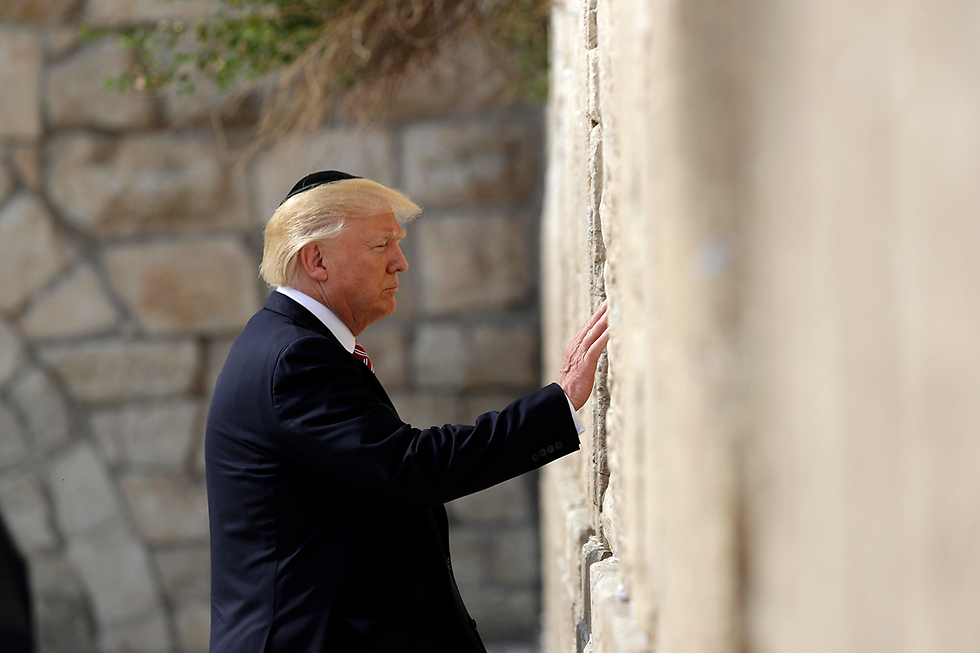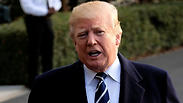
Trump’s Jerusalem declaration could ignite a major fire
Op-ed: While the US president’s expected recognition of Jerusalem as Israel’s capital has a clear symbolic value, there will be no actual change on the ground and the statements about the embassy’s relocation will remain on paper. Nevertheless, in the violent region we live in, such a declaration has a highly explosive potential.
Unlike his predecessors, however, Trump is expected to declare on Wednesday that the United States recognizes Jerusalem as Israel’s capital.
While this expected declaration has a clear symbolic value, nothing will actually change. Nor should it be seen as a sign that the trucks are heating up their engines to lead the US Embassy’s equipment to Jerusalem. The election campaign statements about the embassy’s relocation will remain on paper.

In general, it seems Trump is handling every diplomatic issue like a pyromaniac who forces the people around him to put out the fire. This week, it will be done by General James Mattis, the US secretary of defense, who arrived in Cairo on Saturday evening in a bid to ease the concerns of the region’s leaders and explain that there is no actual change in the American policy on Jerusalem. In other words, the president’s declaration won’t include a recognition of Israel’s rule over united Jerusalem—in other words, east Jerusalem.
Trump’s expected declaration on Jerusalem could turn into a match that would ignite a major fire in the violent region we are living in. But despite Hamas’ call for an intifada in response to Trump’s expected declaration, I believe we are not facing an uprising in the territories any time soon.
Nevertheless, we should listen to the voices coming from Amman and Ramallah: The Palestinians have warned the American president that he is “playing with fire” and that the declaration would put an end to the effort to renew peace negotiations. Jordan’s King Abdullah rushed to Washington to present the administration heads with his own warning signs: An American recognition of Israel’s sovereignty in Jerusalem, without an agreement that would include the holy sites on the Temple Mount and without the establishment of a Palestinian state with east Jerusalem as its capital, could put the Hashemite Kingdom’s actual existence in danger. The international community likely won’t adopt the declaration either.
And back to us: Those who seek international recognition of Israel’s sovereignty in Jerusalem must initiate far-reaching moves for an agreement. Any change in the existing status quo could only take place as a result of negotiations that would force all parties to make painful concessions. There appears to be no willingness for such concessions, however, both on the Israeli side and on the Palestinian side, which has insisted on missing opportunities for an agreement all these years (they rejected proposals from two Israeli prime ministers for far-reaching agreements that brought them closer to an independent state and to a partnership in running he holy sites in east Jerusalem).

This was implied several days ago by former Foreign Minister David Levy, as he made a rare appearance at an event marking 40 years since Egyptian President Anwar Sadat’s visit to Israel. “It’s time to take the initiative,” he said in a clear hint at Prime Minister Benjamin Netanyahu. “The important thing is not to survive (in power) but to initiate.” One doesn’t have to be prime minister to state the dangers Israel is facing, he added. It’s enough to be a journalist.
In other words, during his long time in office Netanyahu chose not to do a thing that might jeopardize his position. His years in power can be defined, if you like, as “lost years.” His supporters on the Right are satisfied with the no-policy policy: Very good, we have all the territories of the Greater Land of Israel in our hands. His opponents are saying that, during these years, we have raced towards a binational state “solution” and to a defeat of the Zionist vision.
Netanyahu boasts a close friendship with the Oval Office tenant, and there’s no doubt he could have used his deep connections with him to raise initiatives for a regional agreement, focusing on a solution to the conflict with the Palestinians. So far, he has failed to do so.
In one of his recent speeches, the prime minister expressed his disappointment over the fact that he doesn’t see a leader of Sadat’s stature on the Palestinian side. It would be only fair to ask if the Israeli side has a leader of the late Menachem Begin’s stature, who would be willing to risk his seat—and even bid farewell to his greatest supporters over the years—for the supreme goal of achieving peace.
Knowing David Levy, I can assume he meant to say that Netanyahu doesn’t possess these qualities of a leader. At best, he is a commentator warning of the dangers we are facing. Or in Netanyahu's words, a holocaust, a holocaust and—once again—a holocaust.

















